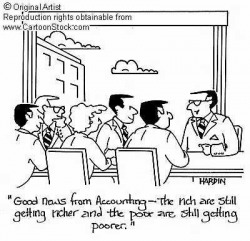The problem is......

Not everyone gets an equal share of the benefits of globalization. Because, most of the time, the proportion of the society that actually get most of the profit and the benefits of globalization is relatively small, some people increase their income in a very rapid pace, while others stay in their current condition, or begin to change in a very slow pace, increasing the gap between the have and the have-not's. This problem of inequality is the major criticism of the consequences of a globalized world.
But the truth is....
The growing economic gap is rather increasing because technology is advancing at every second while people are being left behind. People around the world are not able to catch up with the constant technology advance, and thus, those who are able to actualize themselves are the ones progressing.
Seems unfair? ... Not everything is lost ... yet

The solution to this gap has to be found in a strategy that combines a new educational policy, health care and benefits. That will provide each country’s citizens a degree of knowledge to compete in this globalized era. A better education would allow less-skilled and lower-income groups to benefit from the opportunities that globalization and the new technologies brings. If the country remains poor and closed to international trade, how could they possibly give their citizens a high degree of education needed to compete with other countries, when the only thing they are thinking of is how to survive everyday? For that reason, opening the doors to globalization through trade and education come together and they are the key to lower, if not close, this wide gap between the rich and poor, and give us all, a more equal share. And not only that, with globalization allowing new technology and therefore, easy access to global information, citizens from any country learn how other people around the world live, and that creates a strong incentive for them to strive and fight for the right to control of their own life, to make their own decisions, to have, what we all call, Freedom. Globalization is changing the health of the planet, in the long run; it minimizes the environmental damage that massive production might produce. Citizens that have their basic needs fulfilled will demand higher environmental standards, and thus new institutions and laws will be created to manage environmental issues. In sum, globalization brings: Prosperity, Human Freedom and, a better and cleaner world to live in
